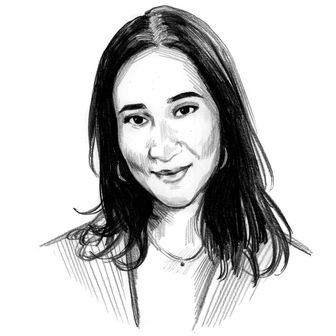
This article was featured in One Great Story, New York’s reading recommendation newsletter. Sign up here to get it nightly.
Last summer, Sean “Diddy” Combs was celebrated at the Apollo Theater for his work in education. The rapper was presented with an award by students from Capital Preparatory Harlem, the charter school he co-founded in 2016, the same year Forbes named him the richest man in hip-hop. The school is advertised as a posh college-prep academy with high-end facilities and a board that has included a number of Black public figures, including a host of The View, one of Dapper Dan’s daughters, and a popular self-help author and TV personality. It’s part of a network of charter schools that has attracted high-profile donors like Andreessen Horowitz and the Koch Foundation, in addition to Combs, who pledged $1 million in 2018. At the Apollo, three graduates took to the stage, eager to meet the Harlem-born rapper, their school’s unofficial mascot. Their entire class was there, said one grad, and all of them had gotten into college. But Combs didn’t show up, blaming airplane troubles. He accepted his award in a video, which seems to have been taken from inside his private jet.
Five months later, Capital Prep would sever ties with Combs after his former girlfriend filed a lawsuit accusing him of abuse, rape, and sex trafficking. (Combs settled with her a day later, though three additional women and one man subsequently filed suits against him with similar claims; he denies all the allegations.) But the school’s relationship with Combs may be the least of its problems. Capital Prep is located in East Harlem, one of New York City’s poorest neighborhoods. It serves nearly 500 students in grades six through 12, the majority of whom are Black and low income. In addition to “a rigorous college preparatory curriculum” designed to produce “engaged citizens for social justice,” Capital Prep advertises a variety of extracurriculars, ample faculty support, and a 100 percent college acceptance rate for graduates. For parents, the promise of an institution backed by Combs and Steve Perry — a charter-school founder whose reputation was built on uplifting poor kids of color — is elite education.
But parents enticed by Capital Prep are calling it a disaster. Fourteen people, including parents, students, and former employees, describe an extremely dysfunctional school environment marked by high teacher turnover and frequent violence. Without a full teaching staff, students could go months without being taught some subjects and instead be found sitting in the lunch room for hours at a time. Leadership has been unstable: The school has had seven principals or interim principals in seven years. In spite of big-name backers, teachers say they were short on necessities like chairs and computers, and botched record-keeping has resulted in incorrect grades, transcripts, schedules, and test data. Fights and schoolwide lockdowns created an atmosphere of fear and chaos. Parents who sought answers found management uncommunicative and adversarial: They say Capital Prep didn’t inform them about things like a bedbug outbreak, and multiple teachers say it was typical for law enforcement to be called on students out of uniform. Besides the occasional photo op, Combs had little to do with the institution. “He was supposed to be an inspiration to those children, coming from what you might consider the hood — and he was not,” says a parent.
Capital Prep Schools disputed the accuracy of this story but declined to go into any specifics. “We accept and are saddened that some scholars and colleagues were not pleased with their experience,” Shenique Coston, director of communications and development for the school’s network, wrote in a statement. “However, we affirmatively state that many of the allegations included in your fact-checking list are fabrications.” Steve Perry and representatives for Combs did not respond to requests for comment.
Parents were drawn to Capital Prep for its social-justice mission and college-acceptance rates, which Combs emphasized in videos made for his YouTube channel and interviews with people like Ellen DeGeneres, who pledged $50,000 to Capital Prep when Combs was on her show. “I liked what they stood for, collectively coming together, teaching our Black and brown kids, giving them equality in education,” says Shakemia Harris, who enrolled her then-11-year-old daughter, Madison, at Capital Prep in 2017, the year after the school opened. Parents were impressed by the school’s open houses, where they met passionate teachers — called “illuminators” — and learned about the school’s college-prep program, which theoretically allowed students — called “scholars” — to earn their associate’s degree while in high school. Rather than traditional parent-teacher conferences where adults talked while children looked on, students were invited to join and discuss their strengths and weaknesses, ranking their abilities on a scale of “kryptonite” to “super power.”
There were other selling points, like the school’s social-justice curriculum, which included a mandatory senior thesis that asked students to raise awareness about a problem in their community, and sharp uniforms: blazers embroidered with the school crest, ties, plaid skirts, and khaki slacks. The uniforms are a hallmark of Steve Perry, the owner of Capital Prep Schools, a network of three charter schools in New York and Connecticut. He bills himself as “America’s Most Trusted Educator,” a reputation he’s burnished with a short-lived talk show and appearances on Oprah, CNN, and BET. His métier is getting poor children of color into college with a tough-love approach to education (one of his books is titled Push Has Come to Shove: Getting Our Kids the Education They Deserve — Even If It Means Picking a Fight). Perry often points to his own background — growing up poor and then graduating from an Ivy League school — as evidence of his credibility.
And then there was the school’s proximity to celebrity. “I thought if Diddy is funding and attaching his name to something, it would be run very tightly, that he was going to give our kids what he didn’t have at that age,” says Harris. Teachers say that Combs donated old studio equipment — couches, a piano — to the school, and in 2022, he brought a group of Capital Prep students to the Billboard Music Awards. Another time, Harris says, Naomi Campbell dropped in to speak with students about self-care. Some Capital Prep students were singers and dancers whose parents hoped they would encounter Combs. “A lot of the parents even chose this school because they hoped that there would be a moment where their kid was ‘discovered’ by Diddy,” says a former teacher.
When Harris’s daughter joined Capital Prep, the school served grades six through eight. Madison would travel every morning from the South Bronx to East Harlem on the subway with her dad; she loved her teachers, and the school felt safe. But the next year, when she was in eighth grade, things started to change. The school added around 100 students and a ninth-grade class. Fights began to break out. The following year, when the school expanded again, adding 170 students and a tenth grade, she felt like the fighting intensified. “It was not a safe building to be in,” says a teacher who worked at Capital Prep during this time. Teachers stepped in as quasi-security. “Kids from other schools would jump our kids at dismissal,” says the teacher. It was typical for staff to walk vulnerable students to their subway stops or line the street before dismissal. (All employees interviewed no longer work at Capital Prep and requested to be anonymous out of fear of reprisal.)
Then, in 2020, the pandemic hit. “We came home in March and then everything crumbled and it just kept crumbling,” says Shirley Payne, whose son, Darnell, had joined the school as a ninth-grader the previous fall. Parents say that during this period, students stopped having regular lessons. “They would log on, and the teacher wouldn’t show up,” says Payne. As happened at schools all over the country, many students — especially those facing housing insecurity (at least 55 students at Capital Prep were unhoused that year) — were unable to keep up with their studies and seemed to disappear from view. Teachers also struggled during this time, and by the end of the year, according to State Education Department data, nearly 80 percent of Capital Prep’s teachers had left. (“Like all public schools in New York City, Capital Prep Harlem confronted unprecedented COVID-19 challenges,” the school said in response to our questions. “Like the rest of the country, Capital Prep Harlem suffered through the collision of the ‘Great Resignation’ and a national teacher shortage.”)
The school was still in shambles when students returned to in-person learning in fall 2021. There were not enough chairs, and rooms would get so crowded students worked in the hallways. Class schedules got bungled: Some students were enrolled in courses they had passed years before, while teachers saw class sizes double or triple with children who weren’t supposed to be there. People were in the building, says a teacher, but often they weren’t in a classroom learning: “There were kids who were sitting in the cafeteria receiving no instruction for hours.” Trustees would brag about donors in board meetings, but on the ground, teachers say they were strapped for materials — “None of that money ever translated to any more resources; it didn’t translate to more laptops, to more boards, or chart paper,” says one. The dysfunction only compounded the school’s attrition problem. “People were quitting left and right because there was just no point,” one teacher says. Another says she was working up to 16 hours a day; management told her and other faculty to cover subjects they weren’t hired for as well as after-school activities. Students were taught by a revolving door of substitutes; at one point, a principal was covering class, according to a parent.
Students felt lost in the churn. “We weren’t being taught anything,” says J’nyla Dixon, who joined the school in 2019 and graduated in 2022. She says her work was rarely graded and four months into her senior year all of her classes were canceled. All seniors were instructed to spend their school day on the “social justice project,” a research project that asked students to identify and solve a problem in their community. J’nyla’s research focused on mental health among LGBTQ people — she interviewed advocacy organizations and surveyed her peers about their sexuality. It was the only thing she worked on for six months, during which time her class cycled through a series of substitute teachers. The instability at school drove her into a depression. Payne’s son, Darnell, was also struggling. “Some days he’d say, ‘Ma, what am I going for? There’s nobody there. There’s no teacher. There’s nothing to do. We’re sitting in a room all day.’” He was also scared; violence was still a problem at Capital Prep, and the school went on lockdown if a fight broke out or if someone brought a weapon, usually a knife, into the building. (“Like other schools, we wrestled with deep community safety concerns, exacerbated by increased violence in both the local community and New York City,” the school says.)
Toward the end of the pandemic, the school had relocated from East 104th Street to 129th and Madison. The building, a 135-year-old Catholic church designated as a landmark by the city, was larger and more impressive than the school’s former digs. But parents say the area outside the new location was dangerous — there were sometimes shootings nearby, and on the walk from the subway to the school, students say they would see drug use on the street. So when Capital Prep began locking students out of the building who arrived late, parents were indignant.
In a video taken in October 2022, parents and students are seen gathered outside the school to confront Perry, who’s standing inside, partially blocked by a security guard. They start by asking him about the lockouts and then everything else — the lack of teachers, students languishing in the cafeteria, why their calls were never answered and their emails ignored. “You dress well, the school is nice, but you’re not setting an example. You’re not holding up to your word,” one parent says. “Diddy has so much money, and we get the butt end of this.” Perry doesn’t say much in the video. Teachers say he wasn’t very involved in the school and, when he did show up, that he would obsess over dress code, standing atop a stairwell, arms folded, issuing uniform infractions. Two teachers recall Perry shouting at a young Black woman who wore a headscarf to school to “get that rag off of your head.” Even students who couldn’t afford uniforms (which could run over $300) were punished.
Students also protested conditions at the school. Over the years, they’d stage walkouts and sit quietly in the hallways, sometimes holding up signs. A teacher says these protests were at times sanctioned and used as photo ops. “They wanted to show like, ‘Hey, this is the social-justice stuff that we’re talking about — our kids are activists, they’re fighting for their rights,’” he says. J’nyla says that nearly 100 students participated in a protest her senior year. They stuck a big sign to one of the school’s entrances listing their grievances — “No Teachers, No Communication, Messed-Up Schedules” — and congregated on the block outside the school before management threatened to call the cops. Students later circulated a Change.org petition to “Save Capital Prep Kids.” “The students at Capital Prep Harlem are fed up with the treatment we get at this school,” it begins, listing concerns from not having enough teachers to the police being called for uniform infractions.
In the spring of 2023, months before her graduation, Madison says a school janitor started commenting on her looks. One day, “he started saying really vulgar things to me,” she says, and she told him to back off. When she and her boyfriend — also a Capital Prep student — left the school later that day, the janitor and her boyfriend got into an altercation. According to a police report and the boy’s mother, who arrived partway through the fight, the janitor allegedly hit him in the head so hard he had to go to the emergency room. Both Madison and her boyfriend faced expulsion, but Harris hired a lawyer and fought back. Eventually, the school reinstated Madison, but during her first week back, Harris says she was attacked by a fellow student, who punched her and threw a cup of coffee at her head.
After her daughter was hurt, Harris gathered parents, local business owners, and teachers outside Capital Prep, where they held posters and handed out flyers — “There Is Little to No Protection of Our Students at Capital Prep,” read one. The event was covered by ABC7 New York, which interviewed Harris, who pleaded with Combs to hold the school accountable.
Parents often tried to reach Combs for help, messaging and tagging him and his businesses on social media. At one point, there was an email address that parents were told went directly to Combs and his team, but they never got a reply or even an automatic response. “I was emailing the teachers. I was emailing leadership. I was emailing everyone. No one is responding to me,” recalls Payne, who tracked down an email address for Capital Prep board member and The View host Sunny Hostin. She never heard back. “There were times that they wouldn’t even allow me to go up to the office to speak to anyone,” Campbell says. “I wasn’t sure what they were trying to hide.”
Harris, Campbell, and Payne considered withdrawing their children from Capital Prep but were worried about destabilizing them even further, especially since their lives and social ties had been strained during the pandemic. Payne even began preparing applications, only to find that her son’s transcripts were so inaccurate they couldn’t be submitted to other schools — “Darnell’s transcripts had classes he’d never taken, passing classes that he never took, failing classes that he was never in.” Capital Prep’s recordkeeping had been a mess for years. An employee who worked in records says that students would sometimes have scores for Regents exams they’d never taken. Another says management once suggested they change a course title on a transcript to satisfy a state requirement. A third employee says almost all transcripts were wrong and that his attempts to flag the problems to management were disregarded. When a teacher left midway through the year without leaving any records about students’ progress, the school had to figure out what to do about their grades. “I was literally sitting in a conversation with the director of data and with the director of schools, and we were talking about what to do with this person’s grades,” the teacher says. “I was like, ‘Well, there’s no teacher.’ And they were like, ‘Really? Oh, okay. Well, then I guess we gotta pass them.’” The disorganization also made some college applications unfeasible. “These colleges started sending transcripts back, like, Oh, no, this ain’t right,” says a teacher.
Capital Prep maintains that 100 percent of its graduates are accepted into four-year colleges, although, according to state data, the school’s graduation rate is around 70 percent. Even when students were accepted into college — the ultimate goal for many parents — they often didn’t arrive ready, teachers say. “These are kids who are barely passing. You’re not helping them by sending them to these four-year colleges. They’re not prepared for the work, because CPH doesn’t have a sufficient college program,” says a teacher. This was the case with Payne’s son, Darnell, who went to college in Texas but failed his first semester. J’nyla now attends a vocational school — she felt demoralized after her experience at Capital Prep. Madison, meanwhile, was accepted into three colleges with scholarships but, after the events of her senior year, did not attend. Harris says she’s now severely depressed and barely leaves her room.
Capital Prep is now enrolling students for the 2024–25 school year, its first without an official affiliation with Combs. Will parents be willing to send their children to the school without its celebrity founder? “Not every child in Harlem is destitute or parentless,” Payne says. “And that’s how they treat them, like they have no parents that care and everyone is just an idiot.”





